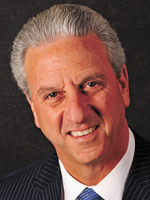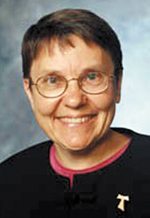By Barb Arland-Fye
Peace and justice issues impacting the Holy Land have been a topic of discussion recently in the Davenport Diocese. Clinton Franciscan Sister Jan Cebula, who returned last month from a study tour to the West Bank and Israel, shared what she learned in a talk Nov. 29 at The Canticle, home of the Clinton Franciscans. On Dec. 6, Michael Siegal, who chairs the board of trustees of the Jewish Federations of North America (JFNA) met with Bishop Martin Amos during a visit to the Quad Cities.
The timing of both visits was fortuitous, diocesan Social Action Director Kent Ferris said. “It speaks to the enormity of peace and justice issues facing those living in the Holy Land that we have a connection to it by way of our speakers and visitors. Prayerfully grounded work needs to be undertaken by those directly involved and for the rest of the world wanting lasting peace.”
Bishop Amos noted that in a letter to Secretary of State Hillary Clinton, the U.S. Conference of Catholic Bishops shared hopes expressed by Pope Benedict XVI earlier this year:
“In the Holy Land, where tensions between Palestinians and Israelis affect the stability of the entire Middle East, it is necessary that the leaders of these two people adopt courageous and farsighted decisions in favor of peace … I express my hopes that [negotiations] … will lead to a lasting peace which guarantees the right of the two peoples to dwell in security in sovereign states and within secure and internationally recognized borders.”
The Catholic Messenger spoke separately with Sr. Cebula and Siegal about the situation in the Holy Land.
Jewish leaders blame Palestinian governance for conflict

As new chairman of the Jewish Federations of North America (JFNA) board of trustees, Michael Siegal and other JFNA members made a solidarity mission to Israel last month.
They arrived in late November, during the eight-day conflict between Israel and Hamas, which CNN describes as a “militant fundamentalist Islamic organization operating in the West Bank and Gaza.”
Siegal, who also serves as chairman and CEO of Olympic Steel, shared his thoughts about the conflict in Israel during a visit to the Quad-Cities on Dec. 6 with Bishop Martin Amos of the Davenport Diocese. He also spoke with other religious and civic leaders.
In a separate conversation with The Catholic Messenger, Siegal emphasized that JFNA is a philanthropic organization, not a political one. Its mission is protecting and enhancing the well-being of Jews and Jewish communities in North America, and around the world; mobilizing financial and social resources through its philanthropic endeavors, strategic initiatives and international agencies to strengthen the Jewish people; and taking responsibility for each other according to principles of caring and compassion, Jewish learning and social justice.
JFNA may have a difference of opinion on various issues concerning Israeli governance, but the organization’s focus is on assisting Jewish people in need around the world. “We’re the voice to fight for a greater civil society in the world,” Siegal said….
Ordinary Palestinians just want to live a normal life

Clinton Franciscan Sister Jan Cebula spent two weeks in the Holy Land recently as part of an Interfaith Peace-Builders (IFPB) study tour of the West Bank and Israel.
“I am most grateful to have had the opportunity to meet with and learn from people who are living in the midst of conflict. I was shocked by the stories of what it is like to live in the West Bank under military occupation,” said Sr. Cebula, former president of the Clinton Franciscans and convener of the Center for Active Nonviolence and Peacemaking.
She shared stories during a Nov. 29 presentation at The Canticle, home of the Clinton Franciscans, of the difficulties ordinary Palestinians endure in their daily lives because of physical barriers, growing Israeli settlements, demolition of homes and other structures and shortage of necessities.
The physical barrier between Israeli and Palestinian territory, intended for security, also prevents many Palestinians from maintaining their livelihoods. “More and more land is being taken from the Palestinians for expansion of the Israeli settlements, military purposes and construction of highways exclusively for the use of the Israelis. What land remains under Palestinian control is quite broken up, not contiguous. This is making the two-state solution less and less viable,” Sr. Cebula said….
To read the rest of these articles, subscribe to The Catholic Messenger’s e-edition.








